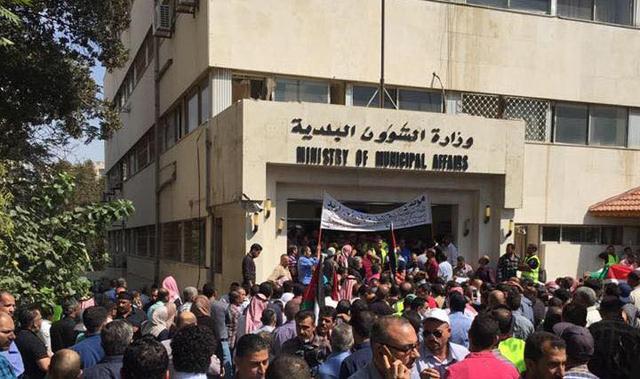You are here
Restructuring of Labour Ministry to protect workers’ rights — activists
By Rana Husseini - Mar 25,2023 - Last updated at Mar 26,2023

A view of the Labour Ministry building (Petra file photo)
AMMAN — Activists and economists have expressed hope that the recent government decision to restructure, rather than abolish, the Ministry of Labour will work to safeguard workers' rights while strengthening the implementation of international labour standards.
During a Lower House session in February, Prime Minister Bisher Khasawneh announced that the government “has no plans to abolish the ministry” as was previously announced in July 2022.
Khasawneh said the government instead decided to restructure the ministry in response to the results of the comprehensive national dialogue conducted by the Economic and Social Council (ESC).
“The feedback from the national dialogue indicated that the majority of the population does not believe that abolishing the Ministry of Labour would be effective,” Khasawneh told MPs.
After receiving the ESC's report on the results of the dialogue, the government decided to maintain and restructure the ministry’s tasks and responsibilities, particularly regarding vocational education and training, the prime minister said.
Director of the Phenix Centre for Economics and Informatics Studies Ahmad Awad stressed that the role of the ministry needs to be activated towards strengthening the enforcement of the Labour Law and its related regulations and instructions.
Awad told The Jordan Times in a recent interview that it has become evident that “the role of the ministry has declined in this field in recent years”.
“The ministry’s focus has become encouraging investment and incentivising the private sector, at the clear cost of labour standards. That is why we were against abolishing it,” Awad said.
The economist added that he was hopeful that the course of restructuring the ministry will work towards ensuring the implementation of Jordanian and international labour standards.
“We also hope that this will work to ensure the stability of labour relations based on respect for law, in order to preserve the labour market balances, so that the interests of both parties to the relationship, workers and business owners, are preserved,” he added.
In addition, Awad said the civil society hopes that this decision will work towards ensuring a comprehensive review of the Labour Law.
He pointed out that the current law includes several gaps and shortcomings that “conflict with international labour standards and Jordan's international obligations”.
He listed issues related to the right to freedom of association and collective bargaining, as the relevant provisions are completely inconsistent with international standards.
Meanwhile, Gender Technical Specialist, International Labour Organisation (ILO) Regional Office for Arab States, Reem Aslan, said that the fact that the labour ministry remained an independent entity is extremely important.
“The labour ministry is in charge of protecting the labourers’ rights,” Aslan told The Jordan Times in a recent interview.
Therefore, Aslan maintained, the existence of such an independent entity will “secure the social and economic stability of workers”.
In addition, she added that the “ministry is the entity that is in charge of amending or introducing legislation that meets international standards”.
SADAQA co-founder and manager, Randa Naffa, said that what is needed is “to strengthen the role of the ministry in addressing labour market challenges and labourers' rights instead of the restructuring”.
Naffa told The Jordan Times that this will be accomplished by activating laws and regulations that work to protect labourers' rights and by introducing tools and mechanisms to enforce existing laws.
In addition, Naffa added that the focus should be also on strengthening the role of inspection teams and directorates to ensure workers' rights.
“The efforts should also be directed towards ensuring the rights of female labourers, including pay equity, establishing nurseries, applying proper work standards, ensuring protection from violence and professional safety,” Naffa added.
Otherwise, Naffa warned, “women’s economic participation will be negatively affected and they will face deeper challenges to join and remain in the labour market”.
“Female labourers will become the prime victims, because the lack of adoption of the necessary measures will result in their increasing poverty and unemployment status,” Naffa said.
Related Articles
AMMAN — Women activists and economists praised recent Parliamentary amendments for their envisioned role in safeguarding the well-being of f
AMMAN — The Economic and Social Council of Jordan (ESC) on Monday launched the outcomes of a series of national dialogues regarding the Publ
AMMAN — Municipality strikers on Sunday signed a memorandum of understanding (MoU) with officials from the Ministry of Municipal Affai


















